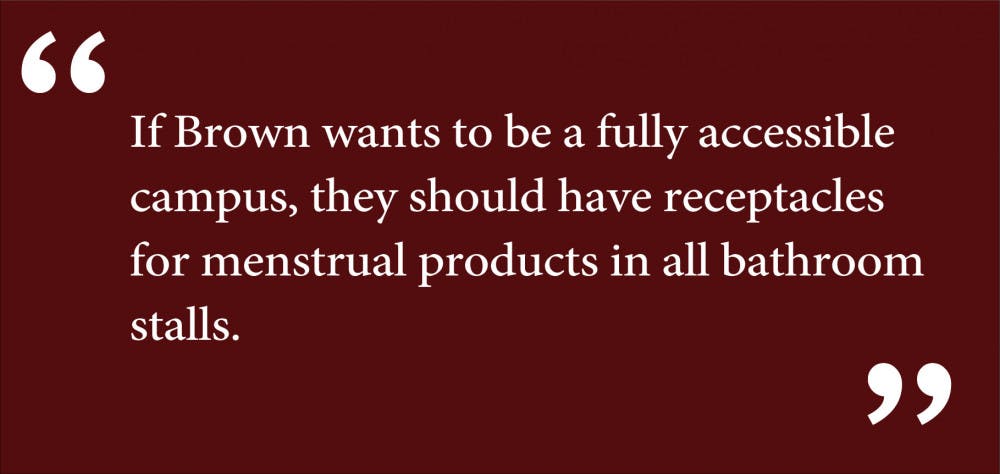As a senior in high school, I wrote an article for my school’s newspaper about how, despite undergoing a $100-million renovation, our restrooms had no receptacles for menstrual products. I assumed that this would be a problem left in the past, as I headed off to an institution with a multibillion dollar endowment that, while small for the Ivy League, still seemed like enough to cover basic necessities.
The last time I flushed a pad down a toilet was in the upstairs bathroom of my dorm. My first period of the semester had just begun, and foolishly, I hadn’t scoped out the territory before sitting down to relieve myself. Although my floormates and I treat the bathroom as gender neutral, it is labeled as a women’s room. I naively thought that both stalls would be equipped with receptacles for hygiene products. I was wrong. My options were to toss a bloodied sanitary napkin into the open trashcan outside the stalls, revealing my fertility status to anyone standing at the sink, or to flush it. You already know what choice I made.
The toilet didn’t clog, thankfully, and so I’m able to tell this story in jest. But my experience could have gone much worse. If Brown wants to be a fully accessible campus, they should have receptacles for menstrual products in all bathroom stalls.
Ensuring that all bathrooms are fully equipped with trash cans is a basic measure to preserve plumbing. Pads and tampons, which are designed for absorbency, can swell and cause serious blockages inside pipes. Brown’s maintenance crew has enough on its hands without having to deal with easily preventable problems.
There is, of course, the option to walk out of the stall, holding a bloodied object wrapped in toilet paper and drop it into the trashcan. I have done this in the past, and I will continue to do it during moments when I am less frustrated over institutions’ inabilities to offer basic amenities. But there are also reasons why people shouldn’t have to hold onto their hygiene products until they’re finished doing their business.
For one thing, I prefer to keep my cycle between me and my period tracking app. As this piece suggests, I don’t think periods are anything to be ashamed of, and I’ll openly admit that I have one. But that doesn’t mean that I want to announce it to my floormates by exiting a stall and casually tossing a used sanitary napkin into the bathroom trashcan while they try to brush their teeth in peace.
To another point, blood smells. It especially smells when it’s in a hot room that regularly fills with steam when students shower. The receptacles in bathroom stalls are almost always either covered or installed with flaps that close automatically, keeping in the scent and keeping out any bugs attracted to bodily fluids.
But the consequences of having to openly dispose of a pad or a tampon can go beyond the unhygienic annoyance that such an experience represents for me, a cisgender woman. Brown made national headlines in 2016, when the Undergraduate Council of Students announced that sanitary products would be available in all non-residential bathrooms, including restrooms designated for men. The success of that initiative remains debatable: I have yet to see a single tampon in a non-residential bathroom this semester, though it is possible that their absence just means that people are using them up quicker than they can be restocked.
What isn’t debatable is that not everyone who menstruates at Brown will be using women’s bathrooms. Sometimes they’ll be more comfortable in bathrooms specifically designated as gender-neutral. Sometimes, as in my dorm, students will use whatever bathroom is closest to their room, regardless of how it is labelled. Sometimes people are transgender men and will use only men’s bathrooms, because, well, they’re men.
For some, walking out of a stall with a used pad in hand isn’t just mildly embarrassing. It’s an experience that requires them to out themselves to anyone else in the bathroom. Besides the emotional distress that sometimes comes with revealing sex assigned at birth, this opens students to confrontations, even physical violence, from other bathroom-goers upset at the idea that transgender folks use the same restrooms as them. There’s no choice when your options are risking the plumbing or risking your safety.
Putting receptacles for pads and tampons in all bathroom stalls across campus may seem like a small gesture, primarily benefiting the university’s sewage system. Still, it would positively impact many members of the Brown community, making our campus safer and more inclusive. And that would be a bloody good thing.
Caroline Mulligan ’19 can be reached at caroline_mulligan@brown.edu.



